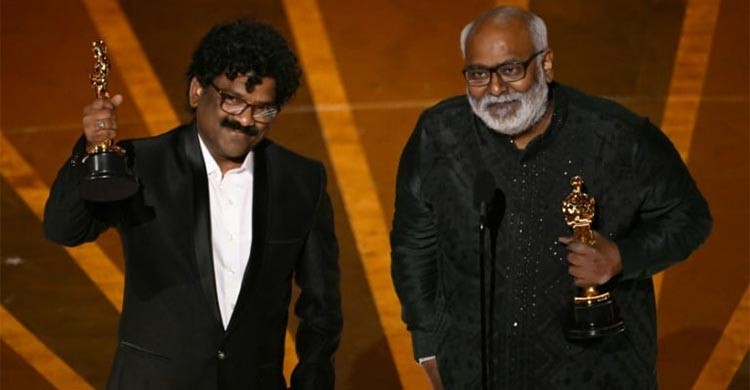Naatu Naatu,' Gaga and Riri: Oscars night in music
13 March 2023, 09:44 pm | Updated: 04 April 2025, 09:19 pm

The viral dance song "Naatu Naatu" made Oscars history Sunday as the first song from an Indian film to win the Academy Award for best original song -- besting heavyweights Lady Gaga and Rihanna to snag the prize, reports AFP.
With music by composer M.M. Keeravani and lyrics by Chandrabose, the win for the Telugu-language song followed an exuberant performance, including the famed "hook dance" steps from the crowd-pleasing film "RRR" rejigged for the Dolby Theatre stage.
Fresh off her career-spanning Super Bowl halftime performance, during which she revealed her second pregnancy, Rihanna also performed her nominated song in what was one of the night's most anticipated moments.
Donning black and silver beaded wide leg pants with elbow-length black leather gloves, swathes of sheer tulle dripping with rhinestones cascaded over her baby bump, the superstar sang "Lift Me Up" from the sequel "Black Panther: Wakanda Forever."
It was a soft but impassioned tribute to the late Chadwick Boseman, who starred in the original film before losing a battle with colon cancer.
Following Rihanna's performance, the last of the evening, her partner A$AP Rocky cheered her on, raising a champagne glass to the global icon and mother of his children.
And Lady Gaga delivered a surprise performance -- she wasn't originally slated to perform -- of her nominated song "Hold My Hand," which she wrote for the Tom Cruise blockbuster sequel "Top Gun: Maverick."
After hitting the carpet in high-glamour Versace and heavy red-lipped, smoky-eyed makeup, Gaga stripped back her look to match her raw, sparsely-produced performance.
The versatile pop phenom -- who has already won an Oscar for her song "Shallow" from "A Star is Born" -- wore a black t-shirt and jeans ripped at the knee, capping off the look with Converse sneakers, a French braid and barely-there makeup.
Calling her song "deeply personal," Lady Gaga offered a heartfelt message before launching into her set: "We need a lot of love to walk through this life."
"We all need a hero sometimes -- there are heroes all around us in unassuming places," she continued. "But you might find that you could be your own hero even if you feel broken inside."
- Hot dog hands -
The 14-time Oscar-nominated songwriter Diane Warren joined performer Sofia Carson onstage to perform their nominated song "Applause" from the movie "Tell It Like a Woman."
That preceded a bizarre performance featuring none other than David Byrne that aimed to achieve the level of wackiness in the film "Everything Everywhere All At Once" -- the night's big winner.
The track "This Is a Life" also earned a nomination for best song, performed for the film by Byrne, Mitski and Son Lux.
Mitski did not join Sunday's festivities, with "EEAAO" cast member Stephanie Hsu -- who earned a best supporting actress nomination for her role in the film -- taking the stage in her place, wearing, like Byrne, all white.
From martial arts choreography to googly-eyed back-up dancers to the infamous hot dog fingers, the staging was rife with references to the film -- including a visual of Raccacoonie, the film's absurdist riff on animated classic "Ratatouille."
Lenny Kravitz graced the Academy with his presence to deliver a touching, piano-driven version of his song "Calling All Angels" for the night's in memoriam segment.
John Travolta choked back tears as he introduced Kravitz's performance to honor those who've died over the past year -- Ray Liotta, Jean Luc-Godard and Angela Lansbury among them -- referencing his beloved "Grease" co-star and friend, the late Olivia Newton-John, with a play on her famous song "Hopelessly Devoted To You."
Hollywood maestro John Williams -- whose iconic compositions include the scores to "Jurassic Park," "Jaws" and "Star Wars" -- fell short of setting the record for oldest Oscar winner ever (though he's still the oldest nominee).
At 91, his work on Steven Spielberg's "The Fabelmans" was up for best score, his 53rd nomination -- but that prize went to Volker Bertelmann for "All Quiet on the Western Front."






















